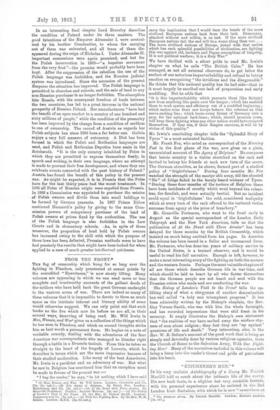" KITCHENER'S MEN,"*
IN his very realistic Autobiography of a Navvy Mr. Patrick MacGill told us much about the intimate life of the navvy. His new book deals, in a slighter but very readable fashion, with his personal experiences since he enlisted in the 2nd London Irish Battalion, with which lie is now " somewhere at • The Amateur Army. By Patrici110. o111, London, IleibertJaai;;. [le, net.]
the front." He tells us how he quickly learnt that he was "a unit in the most democratic army in history; where Oxford undergraduate and farm labourer, Cockney and Peer's son lost their identity and their caste in a vast war machine "; and how he also learnt " that Tommy Atkins, no matter from what class he is recruited, is immortal, and that we British are one of the most military nations in the world." We are glad to see that Mr. Mac Gill, in common with every one else who knows the facts, pays a tribute of esteem to the non- commissioned officers who are still, as Mr. Kipling once sang, the backbone of the Army :—
" No man who has trained with the new Army can be lacking in respect for the indefatigable N.C.O., upon whom the brunt of the work has fallen. With picturesque scorn and sarcasm he has formed huge armies out of the rawest of raw material, and all in a space of loss than half a year. His methods are sometimes strange and his temper short ; yet he achieves his end in the shortest time possible. He is for over correcting the same mistakes and rebuking the same stupidity, and the wonder is, not that he loses his temper, but that he should ever be able to preserve it. He understands men, and approaches them in an idiom that is likely to produce the best results."
Mr. MacGill has a lively pen and the happy gift of vivid description. Within the compass of little more than a hundred pages he covers all the essential points that come within the notice of a soldier rapidly training for war. All those who want to know what kind of life their relatives or friends are leading in the new armies cannot do better than read this little book, which is a worthy supplement from the inside to Mr. Kipling's brilliant account of "Kitchener's men" from the outside.



































 Previous page
Previous page